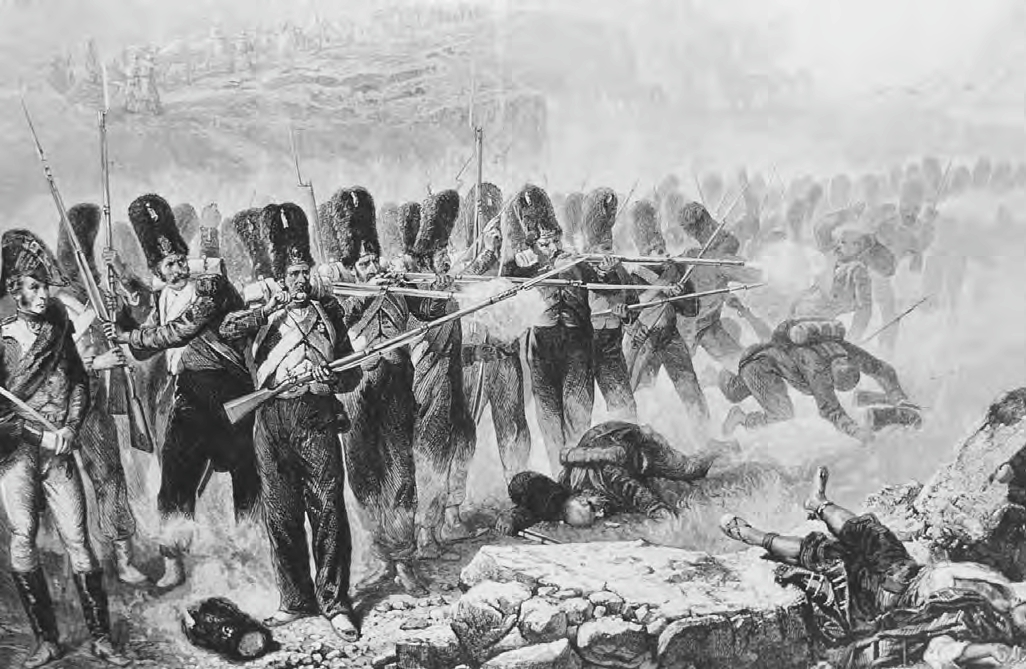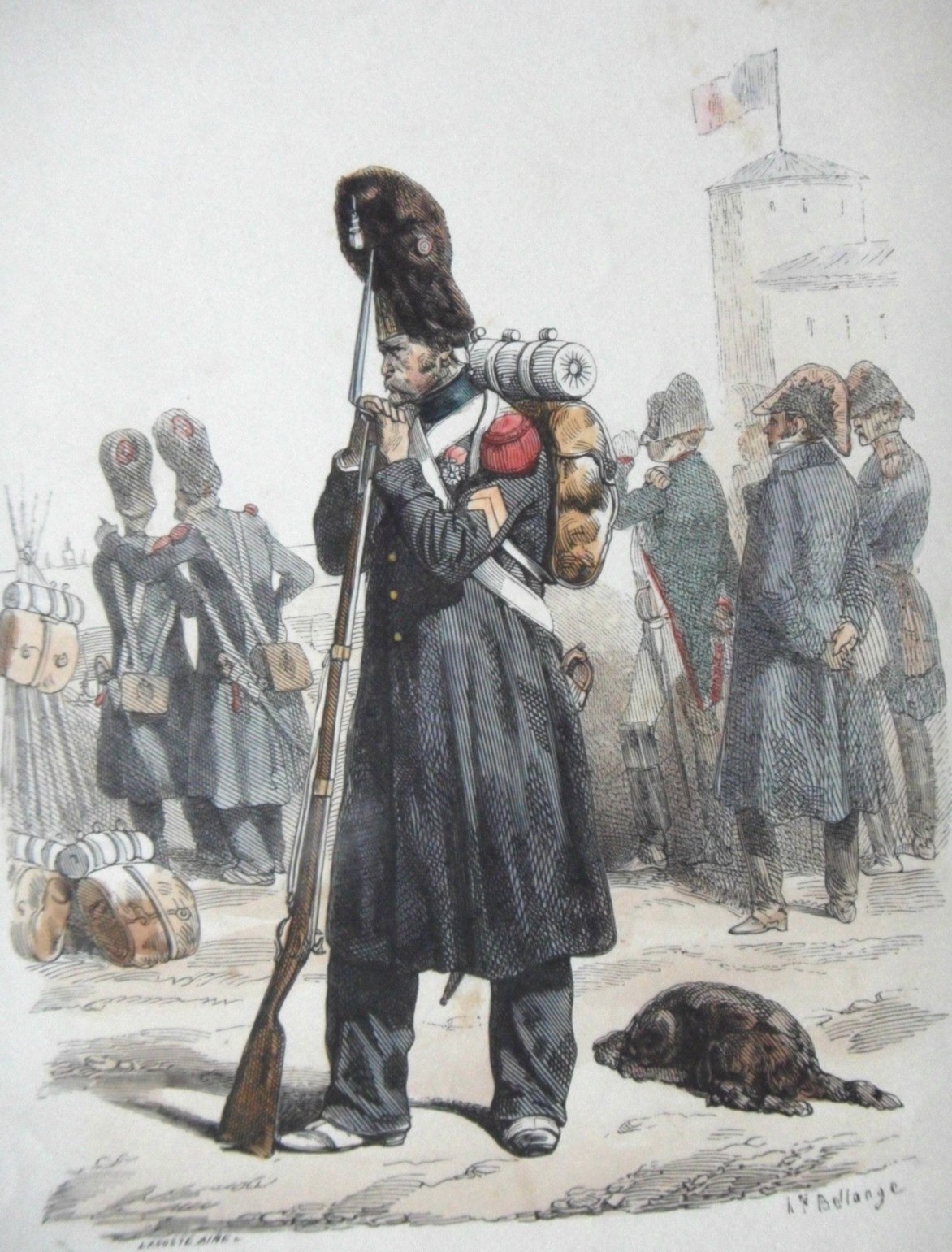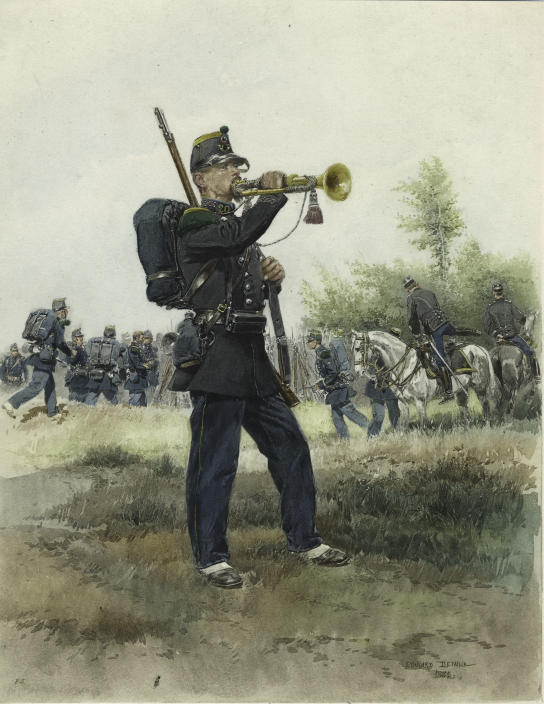|
Old Guard (France)
The Old Guard (french: Vieille Garde) were the veteran elements of the Emperor Napoleon's Imperial Guard. As such it was the most prestigious formation in Napoleon's ''Grande Armée''. French soldiers often referred to Napoleon's Old Guard as "the Immortals". Famously devoted to the Emperor, who even referred to them as "my children"; the members of his Old Guard were selected based on physical traits, most notably above-average height. Their imposing stature was likely impressive to foes and allies alike. Awards as well as veterancy were also taken into consideration when selecting troops for the Old Guard. Old Guard infantry There were four regiments of Old Guard infantry: 1st and 2nd each of grenadiers and chasseurs. Members of the Old Guard benefitted from a number of different privileges, including considerably increased wages from the Imperial Guard. Requirements for Old Guard candidates * under 35 years of age at entry * at least 10 years of service * at least three ca ... [...More Info...] [...Related Items...] OR: [Wikipedia] [Google] [Baidu] |
Grenadier
A grenadier ( , ; derived from the word '' grenade'') was originally a specialist soldier who threw hand grenades in battle. The distinct combat function of the grenadier was established in the mid-17th century, when grenadiers were recruited from among the strongest and largest soldiers. By the 18th century, the grenadier dedicated to throwing hand grenades had become a less necessary specialist, yet in battle, the grenadiers were the physically robust soldiers who led assaults, such as storming fortifications in the course of siege warfare. Certain countries such as France (Grenadiers à Cheval de la Garde Impériale) and Argentina (Regiment of Mounted Grenadiers) established units of Horse Grenadiers and for a time the British Army had Horse Grenadier Guards. Like their infantry grenadier counterparts, these horse-mounted soldiers were chosen for their size and strength (heavy cavalry). Today, the term is also used to describe a soldier armed with a grenade launcher, a weapo ... [...More Info...] [...Related Items...] OR: [Wikipedia] [Google] [Baidu] |
Imperial Guard (Napoleon I)
The Imperial Guard (French: ''Garde Impériale'') was originally a small group of elite soldiers of the French Army under the direct command of Napoleon I, but grew considerably over time. It acted as his bodyguard and tactical reserve, and he was careful of its use in battle. The Guard was divided into the staff, infantry, cavalry, and artillery regiments, as well as battalions of sappers and marines. The guard itself as a whole distinguished between the experienced veterans and less experienced members by being separated into three sections: the Old Guard, Middle Guard and Young Guard. History The Guard had its origin in the Consular Guard (''Garde des consuls''), created November 28, 1799, by the union of the Guard of the Directory (''Garde du Directoire exécutif'') and the Grenadiers of the Legislature (''Grenadiers près de la Représentation nationale''). These formations had for principal purpose the security of the executive and legislative branches of the French ... [...More Info...] [...Related Items...] OR: [Wikipedia] [Google] [Baidu] |
Grenadiers à Cheval De La Garde Impériale
The Mounted Grenadiers of the Imperial Guard () was a heavy cavalry regiment in the Consular, then Imperial Guard during the French Consulate and First French Empire respectively. They were the senior Old Guard cavalry regiment of the Imperial Guard and from 1806 were brigaded together with the Dragons de la Garde Impériale.Pigeard, 139-140. A part of the Republican Consular Guard, the Grenadiers became the senior "Old Guard" heavy cavalry regiment when the Imperial Guard was founded, in 1804. Their maximum official complement was just over 1100 officers and troopers, commanded by a general of division or a seasoned general of brigade, with some of the most famous cavalrymen of the time as commander. Rarely committed to battle during the Napoleonic Wars, they were usually kept in reserve, alongside the Emperor, during the most significant battles. When sent into action, such as during the battles of Marengo, Austerlitz, Eylau, Hanau or Waterloo, as well as during a number o ... [...More Info...] [...Related Items...] OR: [Wikipedia] [Google] [Baidu] |
Guard Grenadier At Eylau
Guard or guards may refer to: Professional occupations * Bodyguard, who protects an individual from personal assault * Crossing guard, who stops traffic so pedestrians can cross the street * Lifeguard, who rescues people from drowning * Prison guard, who supervises prisoners in a prison or jail * Security guard, who protects property, assets, or people * Conductor (rail) § Train guard, in the UK, Australia, New Zealand, and India Computing and telecommunications * Guard (computer science), in programming language, an expression that directs program execution * Guard (information security), a device for controlling communication between computer networks * Guard interval, intervals in transmission, used in telecommunications * Aircraft emergency frequency, commonly referred to as "guard" Governmental and military * Border guard, a state security agency * Coast guard, responsible for coastal defence and offshore rescue * Colour guard, a detachment of soldiers assigned to t ... [...More Info...] [...Related Items...] OR: [Wikipedia] [Google] [Baidu] |
Legion Of Honor
The National Order of the Legion of Honour (french: Ordre national de la Légion d'honneur), formerly the Royal Order of the Legion of Honour ('), is the highest French order of merit, both military and civil. Established in 1802 by Napoleon Bonaparte, it has been retained (with occasional slight alterations) by all later French governments and regimes. The order's motto is ' ("Honour and Fatherland"); its seat is the Palais de la Légion d'Honneur next to the Musée d'Orsay, on the left bank of the Seine in Paris. The order is divided into five degrees of increasing distinction: ' (Knight), ' (Officer), ' (Commander), ' (Grand Officer) and ' (Grand Cross). History Consulate During the French Revolution, all of the French orders of chivalry were abolished and replaced with Weapons of Honour. It was the wish of Napoleon Bonaparte, the First Consul, to create a reward to commend civilians and soldiers. From this wish was instituted a , a body of men that was not an order of ... [...More Info...] [...Related Items...] OR: [Wikipedia] [Google] [Baidu] |
Chasseur
''Chasseur'' ( , ), a French term for "hunter", is the designation given to certain regiments of French and Belgian light infantry Light infantry refers to certain types of lightly equipped infantry throughout history. They have a more mobile or fluid function than other types of infantry, such as heavy infantry or line infantry. Historically, light infantry often fought ... () or light cavalry () to denote troops trained for rapid action. History This branch of the French Army originated during the War of the Austrian Succession when, in 1743, Jean Chrétien Fischer was authorized by the Charles Louis Auguste Fouquet, duc de Belle-Isle, Marshal de Belle-Isle to raise a 600 strong mixed force of infantry and cavalry. It was called ''Chasseurs de Fischer.'' During the remainder of the 18th century various types of light troops () were employed within the French army, either as independent units or as companies within existing regiments. In 1788, there were 8 battalion ... [...More Info...] [...Related Items...] OR: [Wikipedia] [Google] [Baidu] |
Grenadier
A grenadier ( , ; derived from the word '' grenade'') was originally a specialist soldier who threw hand grenades in battle. The distinct combat function of the grenadier was established in the mid-17th century, when grenadiers were recruited from among the strongest and largest soldiers. By the 18th century, the grenadier dedicated to throwing hand grenades had become a less necessary specialist, yet in battle, the grenadiers were the physically robust soldiers who led assaults, such as storming fortifications in the course of siege warfare. Certain countries such as France (Grenadiers à Cheval de la Garde Impériale) and Argentina (Regiment of Mounted Grenadiers) established units of Horse Grenadiers and for a time the British Army had Horse Grenadier Guards. Like their infantry grenadier counterparts, these horse-mounted soldiers were chosen for their size and strength (heavy cavalry). Today, the term is also used to describe a soldier armed with a grenade launcher, a weapo ... [...More Info...] [...Related Items...] OR: [Wikipedia] [Google] [Baidu] |
National Psychological Association For Psychoanalysis
The National Psychological Association for Psychoanalysis (NPAP) is an institution established in New York City by Theodore Reik in 1948, in response to the controversy over lay analysis and the question of the training of psychoanalysts in the United States. Following the lead established by Sigmund Freud, the NPAP offers training to the three core disciplines of medicine, social work, and psychology, as well as to graduates from the humanities. History Over the following decades, inevitably dissensions emerged in the organization, and other non-medical training institutions were set up in the United States. Current ideology The organization currently sees itself as a vibrant professional association A professional association (also called a professional body, professional organization, or professional society) usually seeks to advocacy, further a particular profession, the interests of individuals and organisations engaged in that professio ... of analysts representing ... [...More Info...] [...Related Items...] OR: [Wikipedia] [Google] [Baidu] |
Cambridge University Press
Cambridge University Press is the university press of the University of Cambridge. Granted letters patent by Henry VIII of England, King Henry VIII in 1534, it is the oldest university press A university press is an academic publishing house specializing in monographs and scholarly journals. Most are nonprofit organizations and an integral component of a large research university. They publish work that has been reviewed by schola ... in the world. It is also the King's Printer. Cambridge University Press is a department of the University of Cambridge and is both an academic and educational publisher. It became part of Cambridge University Press & Assessment, following a merger with Cambridge Assessment in 2021. With a global sales presence, publishing hubs, and offices in more than 40 Country, countries, it publishes over 50,000 titles by authors from over 100 countries. Its publishing includes more than 380 academic journals, monographs, reference works, school and uni ... [...More Info...] [...Related Items...] OR: [Wikipedia] [Google] [Baidu] |
School For Advanced Studies In The Social Sciences
The School for Advanced Studies in the Social Sciences (french: École des hautes études en sciences sociales; EHESS) is a graduate ''grande école'' and ''grand établissement'' in Paris focused on academic research in the social sciences. The school awards Master and PhD degrees alone and conjointly with the grandes écoles ''École Normale Supérieure'', ''École Polytechnique'', and ''École pratique des hautes études.'' Originally a department of the École pratique des hautes études, created in 1868 with the purpose of training academic researchers, the EHESS became an independent institution in 1975. Today its research covers social sciences, humanities, and applied mathematics. Degrees and research in economics and finance are awarded through the Paris School of Economics. The EHESS, in common with other grandes écoles, is a small school with very strict entry criteria, and admits students through a rigorous selection process based on applicants' research projects. ... [...More Info...] [...Related Items...] OR: [Wikipedia] [Google] [Baidu] |
Annales
Annals are a concise form of historical writing which record events chronologically, year by year. The equivalent word in Latin and French is ''annales'', which is used untranslated in English in various contexts. List of works with titles containing the word "Annales" *Annales (Ennius), ''Annales'' (Ennius), an epic poem by Quintus Ennius covering Roman history from the fall of Troy down to the censorship of Cato the Elder * Annals (Tacitus) ''Ab excessu divi Augusti'' "Following the death of the divine Augustus" * Annales Alamannici, ed. W. Lendi, Untersuchungen zur frühalemannischen Annalistik. Die Murbacher Annalen, mit Edition (Freiburg, 1971) * Annales Bertiniani, eds. F. , J. Vielliard, S. Clemencet and L. Levillain, Annales de Saint-Bertin (Paris, 1964) * Annales du Muséum national d'histoire naturelle, Paris, France. Published 1802 to 1813, then became the Mémoires then the Nouvelles Annales * Annales Fuldenses, ed. F. Kurze, ''Monumenta Germaniae Historica'' SRG (Hanov ... [...More Info...] [...Related Items...] OR: [Wikipedia] [Google] [Baidu] |





.jpg)
